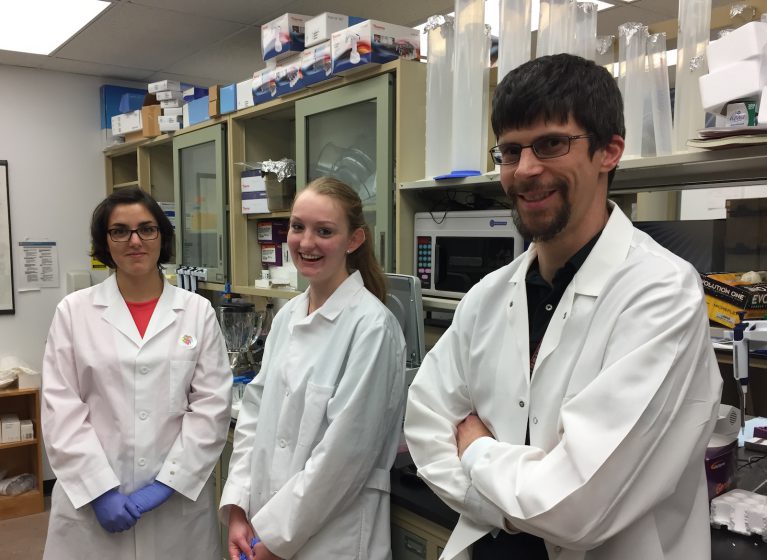Ioana Marin is a graduate student in neuroscience here at UVA. She’s pictured at far left, along with researchers Jennifer Goertz and Alban Gaultier, PhD. They made the very cool discovery that it’s possible to reverse the symptoms of depression in mice just by feeding them Lactobacillus, the probiotic bacteria found in yogurt with live cultures.
One of my goals for this blog is to introduce you to some of the people behind the science, so this seemed like a great opportunity to give you the inside scoop from Ioana’s perspective.
Ioana, how did you get involved in this project?
“I joined [Jonathan Kipnis’] lab and was interested in studying immune responses to stress and also had a dormant interest in the microbiome in the gut, because the gut has its own nervous system. As a neuroscientist, I was interested in that, and I’m learning more about immunology. I was also interested in how these systems play a role in the gut and the connection to the brain, which was still very new. Now a lot more is known. I was doing some preliminary work and then there was this initiative from the NIH [National Institutes of Health] and also the university issued this research founding opportunity. Because we had this interest in the lab, Jony [Kipnis] was like, ‘You should really do this.’ So we wrote a preliminary grant and got funding for a year from the [UVA] vice president for research’s office. That’s how we started working on this. Essentially, we started looking at how the microbiome changes with chronic stress. That’s when I started working really closely with Alban [Gaultier], because he had a lot more expertise in molecular biology and biochemistry than we had.“
What was it like working on the project?
“It’s pretty cool. I learned so much that I didn’t expect to learn. It was definitely a new way for me to go that I didn’t really expect. … I’m a neuroscience graduate student, right, so I was primarily focused on the brain. I’m really interested in behavior, but particularly what underlies the behavior. I joined the lab, which is a neuroimmunology lab, so there was another system, the immune system, added to the nervous system to study and to understand these complex interactions. Then we moved to the gut microbiome, so that’s another system to understand and figure out how it functioned and how it could affect the brain. And then we went down a metabolism road, which is, again, a different connection that I had never thought of before I started working on this project. It’s been exciting to learn about everything.”
This is quite a finding. Will you continue to pursue it after you get your PhD?
“Right now I’m planning to go back to the underlying mechanisms in the brain, so more the pure neuroscience. But I am considering coming back to the microbiome field, perhaps, later. Career-wise, I think it definitely helps me to understand people from different fields. I can now, in a way, almost speak three languages: the neuroscience, the immune system and the microbiome. It’s always a plus being multilingual.”
Do you think this finding, and others like it, will lead researchers to take a more holistic view of how these systems interact?
“I think that’s definitely the way science is going. I think we’re developing more and more the capacity to understand that. Neuroscience, in and of itself, is an interdisciplinary field. You have to consider the brain from a behavioral point of view, then the chemical and the physical and whatnot. … The brain really controls everything in the body and through the peripheral neurons really knows everything in the body, so it’s also affected by the other processes. I think more and more we’ll see a multi-system focus.”
Ioana is wrapping up her PhD work here at the School of Medicine and is set to begin her postdoctoral work at Stanford in April. Best of luck to her. She’s starting her career with quite an entry on her resume.
